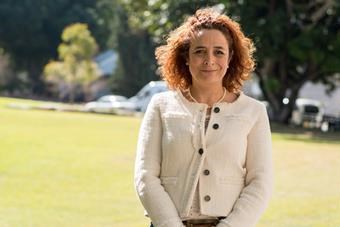
Our blood is our very life force, performing the basic functions that keep us alive. It carries nutrients and oxygen to our cells, and bears away metabolic waste. And yet it also plays a role in a number of all-too-common diseases, such as blood cancers. In fact, according to the Leukemia & Lymphoma Society, someone is diagnosed with a blood cancer every three minutes.
Blood cancers begin in the bone marrow, where blood cells are produced, or in the lymphatic system, which removes excess fluids from the body’s tissues and produces immune cells. In most blood cancers, uncontrolled growth of abnormal blood cells interferes with the development and function of normal, healthy blood cells.
Prof. Idit Shachar, Head of the Department of Immunology at the Weizmann Institute of Science, is investigating new ways to treat these cancers.

“We want to design an antibody or a drug that will allow us to specifically kill cancer cells, so it’s a more targeted treatment than chemotherapy,” she says. “Chemotherapy kills a lot of other cells in addition to the cancer cells, which is why it causes so many side effects.”
One of the conditions she is focusing on is chronic lymphocytic leukemia (CLL), in which white blood cells called B cells build up in the blood, bone marrow, and lymph nodes. The lifespan of a normal B cell is limited by an internal self-destruct program, but in cancerous B cells this mechanism breaks down. B cells that don’t self-destruct can live on to multiply and eventually accumulate in dangerous amounts.
By blocking interaction between the bone marrow and myeloma cells, Prof. Shachar was able to kill off the cancerous cells – a treatment she hopes to commercialize soon.
“I started my research with basic science questions, like ‘how is the survival of a healthy B cell maintained?’” says Prof. Shachar. Her lab team discovered that a specific receptor – a protein on the outer surface of healthy B cells – fulfills a crucial role in helping these cells to survive.
Prof. Shachar wondered if the same protein might also be a central player in the abnormally high survival rates of cancerous B cells. Examining B cells taken from CLL patients, Prof. Shachar and her team found that, even in the earliest stages of the disease, these cells have an unusually high level of the survival receptor. In addition, her studies revealed that activation of this receptor induces the expression of another protein that bridges between the CLL cells and their microenvironment, which is known to support the survival of the malignant cells.
Chemotherapy destroys cancer cells, but also healthy ones, which is why Prof. Shachar aims to design a more targeted treatment “that will allow us to specifically kill cancer cells.”
These studies suggest that blocking this cascade will induce CLL cell death and release the cells from their supportive environment in the bone marrow. Releasing the cells from these occupied niches will allow the formation of normal and functional immune cells. The scientists treated CLL cells with an antibody that blocked their activity and caused the cancer cell death rate to soar.
“Since this research is still at an early stage, we chose to do a clinical trial with patients who were already very sick,” she says. “The results were promising. In patients that received the blocking antibody, the CLL cells were dying more rapidly than the CLL cells in patients who were not treated.”
She is now investigating a similar technique to treat multiple myeloma, a condition that causes cancer cells to accumulate in the bone marrow and crowd out healthy blood cells. Myeloma cells grow and expand almost exclusively within the bone marrow, suggesting that this microenvironment is essential for their survival. Prof. Shachar and her team are developing a blocking antibody to disrupt the interactions between the myeloma cells and the bone marrow microenvironment.
“We believe that if we block these interactions, the myeloma cells will be released from the bone marrow and will die,” she says. “We hope that in the near future we’ll be able to commercialize this kind of treatment.”
Born in Israel, Prof. Shachar received her BSc, MSc, and PhD degrees in biochemistry from Tel Aviv University, going on to complete a postdoctoral fellowship at Yale University School of Medicine. In 1998, she joined the Weizmann Institute as a senior scientist. Today she is an award-winning researcher with five patents to her name.
As a woman in science, Prof. Shachar deals with the challenges of balancing family and research – “not an easy problem,” but one the Weizmann Institute is working hard to resolve.
Prof. Shachar is well aware of the unique challenges that face female scientists, particularly those who pursue the postdoctoral research that is crucial to a career in science. Her daughter was born during her postdoc time at Yale, and her son was born a few years after she joined the Weizmann Institute. Juggling family and research required sacrifice: “My family is the most important thing in my life,” she says, “so I would often leave work at four or five o’clock to be with my kids, and then if I had to come back to work later, I did.”
Many Israeli women with PhDs in scientific fields are afraid to pursue professorial positions, Prof. Shachar notes. “They see how difficult it is. As women we know that even if we have a very supportive family, we have a lot of responsibility for taking care of things at home.”
She recognizes that there’s still much work to be done in addressing the barriers faced by women in science, although the Weizmann Institute has a deep commitment to reducing obstacles: programs such as the Israel National Postdoctoral Award Program for Advancing Women in Science, and resources like on-campus daycare and a mentoring program for female students, help create a supportive environment. “It’s not an easy problem, but it’s one the Institute is trying to solve,” says Prof. Shachar.
Of course, inspiring role models such as Prof. Shachar make a tremendous difference, too.
Prof. Idit Shachar’s research is supported by the Belle S. and Irving E. Meller Center for the Biology of Aging, which she heads; the Steven and Beverly Rubenstein Charitable Foundation; the Leona M. and Harry B. Helmsley Charitable Trust; the Quinquin Foundation; the Rising Tide Foundation; and the Judy and Bernard Briskin Family Foundation. She is the incumbent of the Dr. Morton & Anne Kleiman Professorial Chair.
